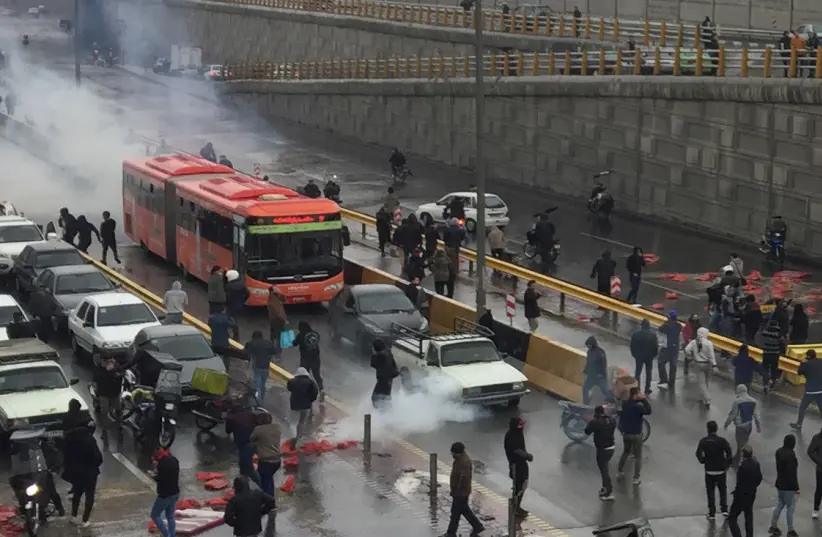
Social media showed protesters marching down the streets of Tehran chanting “Neither Gaza nor Lebanon, I will sacrifice my life for Iran.”
Protests in Iran are entering their third week, with widespread arrests of protesters and deadly use of force.
Demonstrations began on July 15 in response to the severe drought and water crisis suffered by Iran’s Arab Ahwazi citizens in Khuzestan. Protesters say that water is only a trigger for the movement, in addition to a long history of repression by the Iranian government.
Since then, protests against the regime and countrywide drought have spread across the country, including to the capital Tehran. Protesters also object to Iran’s foreign policy agenda, especially given the lack of necessities domestically.
A video shared on social media showed protesters marching down the streets shouting slogans such as “Death to the dictator” and “Neither Gaza nor Lebanon: I will sacrifice my life for Iran.”
#تظاهرات_همبستگی در #تهران
ایرانی با غیرت، حمایت حمایت!
دوشنبه ۴ امرداد ۱۴۰۰#اعتراضات_سراسری pic.twitter.com/PAdOUTQWbO
— KayhanLondon کیهان لندن (@KayhanLondon) July 26, 2021According to Amnesty International on Friday, in response to the protests, security forces have killed at least eight protesters, including a teenage boy, in seven different cities.
The Iranian Mehr News Agency reported on Monday that shopkeepers began protesting after an hours-long power outage in parts of Tehran. A spokesman for the electricity provider stated that the power outage was caused by excessive power consumption in a local building.
“Iran’s security forces have deployed unlawful force, including by firing live ammunition and birdshot, to crush mostly peaceful protests taking place across the southern province of Khuzestan,” Amnesty International said in a statement.
“Video footage from the past week, coupled with consistent accounts from the ground, indicate security forces used deadly automatic weapons, shotguns with inherently indiscriminate ammunition, and tear gas to disperse protesters.”
In addition to lethal response, there have also been reports of Internet outages across the country, including in the Ahwazi region of Khuzestan as well as populated areas in Tehran, specifically near the University of Tehran, Sadeghieh and Tehranpars.
According to Netblocks, a web-outage monitor, parts of the country that were experiencing protests saw a “near-total Internet shutdown that is likely to limit the public’s ability to express political discontent or communicate with each other and the outside world.”
IN SPITE of the limits on speech on social media, hashtags about the protests were still trending on Twitter.
Hashtags today from the Iran protests #خوزستان_تنها_نیست#تهران#اعتراضات_سراسرى
— Middle East Center for Reporting and Analysis (@MidEast_Center) July 26, 2021Maryam Rajavi, leader of the opposition group National Council of Resistance of Iran, expressed support for the protests on Twitter Monday, writing that “The young protesters in #Tehran display the Iranian people’s firm resolve to establish democracy and national sovereignty. #IranProtests”
In response to crackdowns, UN High Commissioner for Human Rights Michelle Bachelet spoke out on Friday against the Iranian government’s response.
“The impact of the devastating water crisis on life, health and prosperity of the people of Khuzestan should be the focus of the government’s attention, not the protests carried out by people driven to desperation by years of neglect,” Bachelet said. “I am extremely concerned about the deaths and injuries that have occurred over the past week, as well as the widespread arrests and detention.”
In the US State Department’s press briefing the same day, principal deputy spokesperson Jalina Porter echoed Bachelet’s sentiments, saying: “The Iranian people have a right to freely voice their frustrations and hold their government accountable. And, plainly, we support the rights of Iranians. We support their rights to peacefully assemble, as well as their rights to express themselves freely. And they should be able to do so without fear of violence or arbitrary detention by security forces.”
Outgoing Iranian President Hassan Rouhani promised to open dams to help alleviate the water shortage, according to Asharq Al-Awsat.
Ahvaz has been the site of anti-government protests in the past, including large protests in November 2019 after a local poet who was known for his criticisms of the Iranian government died and rumors spread that he was poisoned by security forces.
The 2019 protests spread throughout Iran, with hundreds killed and thousands arrested as Iranian security forces violently cracked down on protesters. Internet access was shut off in many areas.
Ahvaz is the regional capital of the ethnically diverse southwestern Khuzestan province, home to most of Iran’s Arabs.
